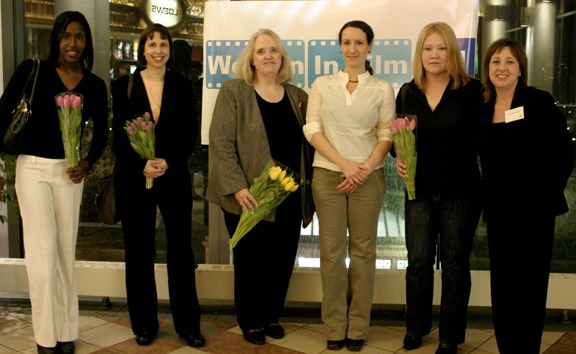
Strength on Screen
Written by Nancy L. Babine | Posted by: Anonymous
Women in Film & Video/New England (WIFV/NE) held its fifth annual screenwriting competition last month, awarding Quincy writer, Mary Conroy, first place honors for her screenplay, The Other War. Over 90 entries were submitted from all over the country. The award marks Conroy’s inaugural first place standing in a national competition.
Like many writers, Conroy’s path has been a circuitous one. Though she has always loved to write, her stories long remained secreted in a notebook or on her computer. She lacked the confidence in her talent that might have otherwise impelled her to show her work or ask for feedback. Upon graduating college, she took a job as a court reporter, a vocation she realized within months was not right for her. She traded the confinement of a stuffy courtroom for the open seas, signing on as director for a cruise ship that catered to the over-60 crowd. “The bucket of rust,” Conroy joked. Though her schedule allowed her no time for writing, her travels afforded her adventures she wouldn’t trade for the world. It was during a trip to Ireland she met her husband.
Conroy returned to writing when her children, now seven and four, emerged from the toddler years. “I was a stay-at-home mom. I needed something for myself,” she said. “That’s when I started pursuing my desires and my passion.” Attending occasional one-day writing seminars whetted her appetite for a more in-depth study of writing for film and television. In 2005 she enrolled in a one-year screenwriting certificate program at Emerson College, where her student screenplay earned her the Award for Excellence.
Her WIFV/NE award-winning screenplay, The Other War, is the story of Trish Collins, a female G.I. who returns from a tour of duty in Iraq, suffering from posttraumatic stress. Complicating her adjustment stateside is a troubled relationship with Keith Watson, an old hometown friend. A civilian contractor with whom she reconnected in Iraq, Keith is haunted by his own wartime memories. He attempts to slay his demons by devoting himself to lobbying Congress for better safety gear for the troops. Trish squelches hers by fixing everything and everybody but herself.
The script was inspired by life experiences during the year Conroy’s sister served in Iraq in the Army Reserve. Throughout that year, Conroy acted as Family Readiness Coordinator for her sister’s unit. Her role was to serve as liaison between the soldiers and their families in the states. It provided her a perspective few civilians have. “I saw the hardships and heartaches from this side,” she said.
She would typically spend at least two hours daily on the phone with members of the soldiers’ families, furnishing information that ranged from answers about medical benefits to how to turn on a computer. She held monthly meetings for the families, composed newsletters, and was responsible for alerting the network of families if one of the soldiers in the unit had been injured or killed. Fortunately, everybody in the unit survived and physical injuries were minimal. “It was the most exhausting process of my life,” she said.
Besides drawing upon her own and her sister’s experiences, Conroy researched Keith’s character by consulting representatives of a civilian organization that raises funds to provide soldiers with protective equipment. Her knowledge about posttraumatic stress was garnered both from materials provided her as Family Readiness Coordinator and from personal interviews with soldiers who had served in Iraq. “When I sat back and listened, they were all saying the same thing,” she said. “They didn’t know how to re-enter. They felt very disillusioned.”
WIFV/NE contest coordinator and second round judge, Jami Brandli, found this year’s entries highly competitive. The contest boasts a total of 20 judges, each possessing a solid understanding of what makes a good screenplay. This year Brandli invited a few of her screenwriting students from Emerson College to participate as judges. About 16 scripts advanced to the second round, and Brandli read each one, winnowing the number down to four. As a former script reader for Egg Pictures and Miramax, she assessed each contender with the critical eye of a professional. “I was a former script reader and we were basically taught to say no,” she said. “The four that made it gave me every reason to say yes. The dialogue was great, the story was clear, the structure was dead-on, the characters were compelling.”
But only one screenplay could be honored with the top prize, and that decision rested with professional screenwriter, Kate Boutilier. After graduating Emerson College in 1981, Boutilier moved to L.A., where she has developed a successful career as a writer for television and film. Boutilier spent the early part of her career writing for several television series, including Falcon Crest, Family Ties, Baywatch, Northern Exposure and Growing Pains, among others. Over the past decade she has tapped into the animation market with projects such as Holly Hobbie, The Rugrats and The Wild Thornberrys, accounting for two of her three Emmy Award nominations.
Boutilier has served as judge for the finalists of the WIFV/NE screenwriting competition for the past few years, an experience she has enjoyed. With each year she has seen a higher level of quality, both in the writing and in the degree of interest of subject matter. This year she performed her task of singling out one script with considerable difficulty. “It was a hard choice,” she said. The female perspective of The Other War influenced Boutilier’s ultimate selection, a departure, she feels, from stories that are traditionally told from a male viewpoint. “What drew me to it was that it was from a woman’s point of view, from someone who served and was there,” she said. “Even in Hollywood we’re not seeing that, yet. A female point of view in wartime is rare, especially firsthand.”
She credited Conroy with boldness in choosing a topic that hasn’t yet been explored and is worthy of attention. She appreciated Conroy’s telling the story without flashbacks, making it seem true in time. She felt the writer artfully revealed the issues haunting the protagonist and developed rich characters. “It has great parts for actors to sink their teeth in,” Boutilier said. “I think that’s important when you’re writing a script, to see that aspect of it.” She had complimentary comments about all the finalists, but said in the end she chose the screenplay that was “a little bit outside the norm.”
The goal of the WIFV/NE screenwriting competition is to recognize film scripts written by women, with strong roles for women. However, men are welcome to submit work for consideration, if the script is either co-written by a woman or features a prominent female role. The competition has generated interest from the film industry. Brandli has already received requests from production companies for loglines of some of this year’s finalists.
As first place winner Conroy’s awards include Final Draft software, a six-month online script placement with Inktip.com, professional script coverage and consideration for representation by L.A. talent agency, ICM. Winning first place in the WIFV/NE screenwriting competition has increased Conroy’s confidence in her future as a screenwriter, and has encouraged her to keep pushing forward. “If I stop and quit, it’s not going to happen,” she said. With perseverance and commitment she is determined to achieve her dreams.
Nancy L. Babine is a writer and filmmaker. She can be contacted at NLBab@comcast.net.
Runner-up honors were given to Naomi Ekperigin and Rhonda Grimm, with an Honorable Mention to Paula Brancato and Nancy Hendrickson. Pictured above from L-R are Naomi Ekperigin, Martie Cook, Diane Lake, Jami Brandli, Mary Conroy and Cheryl Eagan-Donovan. Screenwriter Mary Conroy can be reached at grif_con@hotmail.com. More information about WIFV/NE can be found at www.wifvne.org. Nancy L. Babine is a writer and filmmaker. She can be contacted at NLBab@comcast.net.











